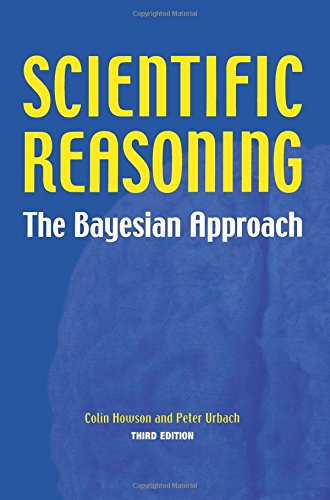Scientific Reasoning: The Bayesian Approach pdf free
Par cambra marie le samedi, juillet 9 2016, 12:32 - Lien permanent
Scientific Reasoning: The Bayesian Approach . Colin Howson, Peter Urbach

Scientific.Reasoning.The.Bayesian.Approach..pdf
ISBN: 081269578X,9780812695786 | 340 pages | 9 Mb

Scientific Reasoning: The Bayesian Approach Colin Howson, Peter Urbach
Publisher: Open Court
Scientific Reasoning: The Bayesian Approach. I remain very interested in this question of the formalisation of scientific reasoning, and – following the original Robot Scientist paper – a new article sets down such an approach and its application to the (more or less) automated reuse of scientific knowledge. The course content is based on the use of likelihood ratios, an approach that is supported by the International Society of Forensic Genetics, the European Network of Forensic Science Institutes and the Association of Forensic Science Providers. Representing and Reasoning With Probabilistic Knowledge: A Bayesian Approach. Scientific.Reasoning.The.Bayesian.Approach..pdf. It lasts 6 months with a workload per week of 3 hours on the online (glass, fibres, gunshot residues), drugs and arson. I still don't see this as sufficiently different from a blue-green tribal fight - there's a lot of "quantitative/Bayesian approaches are the way to go, and everyone else sucks". As he pointed out, the problem lies with The basis of frequentist reasoning is a prediction of the outcome of many repetitions of the same test, providing an estimate of how frequently a particular result will show up. (Howson and Urbach, Scientific Reasoning: The Bayesian Approach, 1989, p. Colin Howson and Peter Urbach, Scientific Reasoning: The Bayesian Approach. Posted by Lydia | May 22, 2013 12:21 PM. Application of BNs for case based probabilistic reasoning and scientific evidence assessment. Link back to: arXiv, form interface, contact. Colin Howson, Peter Urbach, Scientific Reasoning: The Bayesian Approach, 3rd edition. This is especially so from a Bayesian point of view, and I much enjoyed reading a clear and formal (and not so new) exposition of this. I've complained before that philosophy is a diseased discipline which spends far too much of its time debating definitions, ignoring relevant scientific results, and endlessly re-interpreting old dead guys who didn't know the slightest bit of 20th century science. Computer Science > Artificial Intelligence authors of this paper are endorsers? In honour of the 250th anniversary of this publication, Bradley Efron examined the question of why Bayes' theorem is not more widely used -- and why its use remains controversial among many scientists and statisticians. However, it would have been easy to come up with equally important and novel results demonstrated via classical non-Bayesian approaches, such as exhibiting the Higgs boson. Heckman recommended this to me and it had a big influence on how I think about econometrics and empirical work.